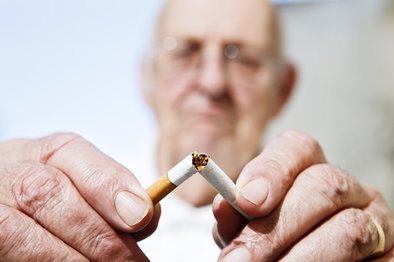
"About 80,000 people in the UK die from smoking every year."
No matter how old you are or how long you have been smoking, quitting can significantly improve a person's overall health and well-being.
What are the side effects of smoking for older people?
- Dry skin/wrinkles - Some of the toxins in cigarette smoke damage the collagen and elastin in our skin, which are fibrous components that keep our skin looking supple and firm.
- Thick, dark mucus - Smokers may experience dark phlegm or mucus due to the pollutants and particles they breathe in from cigarette smoke. Smoking can also damage the cilia, which helps the lungs get rid of phlegm, and consequently smokers may cough up more dark phlegm.
- Decreased muscle - Research published in 'The Journal of Physiology' suggests that smoking directly damages a smoker's muscles. It lowers the number of small blood vessels thst bring oxygen and nutrients to muscles in the legs.
- Eye damage - According to All About Vision, Smokers are up to 4 times more likely to go blind in old age. Smoke is known to irritate eyes and contributes to dry eye, which causes irritation, itchiness & redness.
- Interferes with the metabolism of medications - This is because tobacco smoke induces the CYP450 enzymes in the liver which play are a crucial role in the absorption, distribution, metabolism and elimination of medications.
What diseases can be caused by smoking?
Type 2 Diabetes
A person is classed as having type 2 diabetes if their blood sugar levels are higher than they should be and their insulin production is either low or their body cannot use it effectively to distribute glucose into the body's cells. Centres for Disease Control and Prevention state that "Smokers are 30-40% more likely to develop type 2 diabetes than non-smokers" & "People who have diabetes and smoke are more likely to have trouble with insulin dosing and controlling diabetes."
Smokers who have diabetes are more at risk of experiencing the following health problems:
- Retinopathy - leads to blindness
- Poor blood flow to the legs and feet - can result in ulcers, infections & in worst case scenarios amputation
- Heart & kidney disease - damage to the heart & kidneys
- Peripheral neuropathy - damaged nerves to the arms and legs causing pain, numbness & poor coordination
Cardiovascular disease
Cardiovascular diseases are a collection of diseases which involve the heart or blood vessels. Smoking makes the walls of a person's arteries sticky from the harmful chemicals (carbon monoxide, tar & nicotine) inhaled, which causes fatty material to get stuck to them. Should the arteries that carry blood to a person's heart get clogged, a heart attack may be experienced. If the arteries that carry blood to a person's brain get clogged, a stroke may be experienced. According to the British Heart Foundation, "Nearly 20,000 UK heart and circulatory disease deaths are attributed to smoking each year."
Examples of cardiovascular diseases:
- Strokes - When the blood supply to part of the brain is cut off leading to possible brain damage or death
- Peripheral arterial disease - When there is a blockage in the arteries to the limbs, often the legs
- Coronary heart disease - When the flow of oxygen-rich blood to the heart muscle is blocked or reduced
- Aortic disease - A group of conditions affecting the aorta, which is the largest blood vessel in the body and carries blood from the heart to the rest of the body. It can become weakened and bulge outwards, and can be life-threatening if it bursts.
Cancer
Cancer Research UK states that "Smoking is the biggest cause of cancer in the world" & that is is also "The biggest preventable cause of cancer in the UK." There are links with smoking and 15 different types of cancer. The 5000+ chemicals in tobacco smoke harm the cleaning system that our bodies use to remove toxins and cause damage to a person's' DNA, including the parts that protect us from cancer. This damage can lead to cancer in our cells.
Examples of cancers that are linked with smoking:
- Lung cancer - "7 in 10 lung cancer cases in the UK are linked to smoking" according to Cancer Research UK. Tobacco smoke contains 60+ different toxic substances which can damage the cells that line the lungs leading to cancer.
- Bladder cancer - Cancerous chemicals from tobacco can be passed into a smokers' bloodstream and filtered by their kidneys into their urine. Urine stores in the bladder meaning that it is repeatedly exposed to these harmful chemicals which can lead to cancer.
- Oesophagus cancer - The harmful chemicals & toxins in tobacco smoke irritate the cells that make up the lining of the oesophagus leading to an increased risk of developing oesphagus cancer.
- Bowel cancer - Smokers are more likely to develop polyps, which are non-cancerous growths in the bowel, but they can turn cancerous if left undiscovered.
Read our article "Do you know what the 5 Most Common Types of Cancer are?" to find out more about cancer.
Chronic Obstructive Pulmonary Disease (COPD)
COPD is the name for a group of lung conditions which lead to breathing difficulties. The leading cause of COPD is smoking. Smoking damages the air sacs, lung lining and airway,s which can result in people having difficulty moving enough air in and out of their lungs. This disease usually affects middle-aged and older adults who smoke and tends to gradually get worse as time goes on.
Osteoporosis
Osteoporosis is a condition where the bones weaken and become more susceptible to fractures, which lead to pain and disability. Studies show a direct relationship between smoking and decreased bone density. Cigarette smoke generates a lot of free radicals, which break down the body's natural defences and can cause damage to organs, cells and hormones involved in keeping bones healthy.
Tooth & gum disease
Gum disease is an infection of the gums that can disrupt the bone structure that supports a person's teeth. It is caused by the build-up of plaque bacteria on, around, and between the teeth, causing gum irritation. If left untreated, this can lead to teeth falling out. Smoking weakens the body's ability to fight off infections, including gum disease, making smokers at a higher risk.
How to quit?
Smoking is addictive, and consequently, it can be a real challenge to quit. However, it is totally worth it for the health benefits that come with it. Nature has published findings showing that the few cells that escape damage as a result of smoking can repair the lungs. This effect has even been seen in people who have been smoking a pack a day for 40 years prior to quitting!
Set a quit date
Decide upon a date that you are going to stop smoking, preferably within the next couple of weeks. This will allow you to plan how you are going to quit, without leaving it so long that you lose the desire & motivation to stop smoking.
Tell family, friends and co-workers that you plan to quit
Let everyone you spend time with know that you are planning to quit smoking so that they can act as a support network to help you through the tough days. You could even ask a fellow smoker whether they would be prepared to quit at the same time as you, so that you can help each other.
Anticipate and plan for the challenges you'll face
Quitting smoking is by no means easy, and it can take real willpower not to give in to having a cigarette. It is important to plan for this before you quit so that you can plan ways to cope with withdrawal symptoms and cravings.
Remove cigarettes and other tobacco products from you home, car and work
Make sure you get rid of any cigarettes in your possession and wash anything that may smell like smoke. Removing reminders will help to keep cigarettes off your mind and prevent you from automatically reaching for one out of habit.
Talk to your doctor about getting help to quit
Visit your GP to discuss whether there's anything they can do/any medication they can prescribe to help you cope with withdrawal symptoms. You may also be able to find products at pharmacies, designed to help people quit smoking, such as nicotine patches & gum.
Smoking is bad for anyone's health, no matter how old or young they are, but natural ageing means that older people are more likely to develop diseases associated with smoking. If you know of an older person who smokes, share this article with them. You never know, it could motivate them to quit smoking and reduce their risk of health complications!
Would you like help with finding care services near you?
Call us on 01865 638018
Send message

